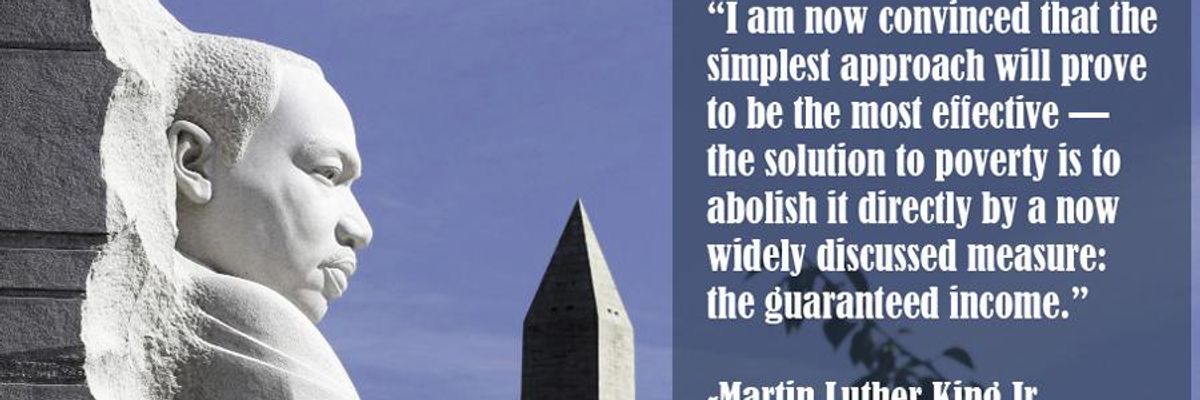Martin Luther King, Jr. day, 2016. This year, as in the past, we'll hear excerpts from his 1963 speech, "I Have a Dream," and references to his 1964 Nobel Peace Prize -- but probably nothing about his 1967 plan to make the dream come true.
Yet his plan is now imperative, more relevant than when he was alive. Americans must act to resolve extreme poverty, income inequality, global warming, racial and gender injustices, and other matters. Yet what are we hearing from the presidential candidates? Mainly the standard litany of conventional policies.
King's plan: "I am now convinced that the simplest approach will prove to be the most effective -- the solution to poverty is to abolish it directly by a now widely discussed measure: the guaranteed income."
Moderate Democrats and moderate Republicans supported guaranteed income in the 1960s. Lyndon Johnson appointed a national commission that held hearings around the country, and unanimously called for "a new program of income supplementation for all Americans in need." Leading economists endorsed it, including Paul Samuelson, James Tobin, and John Kenneth Galbraith; also Milton Friedman, who called his version a "negative income tax." Richard Nixon's Family Assistance Plan passed the House of Representatives by two-to-one, twice, but was then blocked in the Senate.
The updated version, basic income, is remarkably simply. Set an amount, say $800 or $1,000 a month, and provide that to every adult citizen unconditionally. Fund it by cutting programs that become superfluous, welfare, corporate welfare, crony capitalism, excess defense spending, and so on - federal, state, and local - and by eliminating tax breaks and deductions, almost all of which benefit the superrich and other special interests. Where the cost of living is high, local and state governments can supplement it. Adjust the amount occasionally to prevent inflation, recessions, and other economic difficulties.
Basic income is a floor, solid and sturdy, replacing a social safety net that's ragged and unraveling. Every American will have money for food and shelter at least, plus the freedom to choose what's best for ourselves, our families, and our communities. Folks who are unemployed or underemployed will be able to get by. Instead of expecting big corporations and wealthy individuals to create jobs for us, we'll find or create jobs for ourselves; we'll be the "job creators."
King was most concerned about justice, equality, and dignity, and he envisioned significant benefits with guaranteed income:
A host of positive psychological changes inevitably will result from widespread economic security. The dignity of the individual will flourish when the decisions concerning his life are in his hands, when he has the assurance that his income is stable and certain, and when he knows that he has the means to seek self-improvement. Personal conflicts between husband, wife and children will diminish when the unjust measurement of human worth on a scale of dollars is eliminated.
Enacting a basic income will require a mass movement, and the foundations are already in place with Black Lives Matter and Occupy Wall Street. We have reasons to be confident of success. Ideas about economic security were central to the Populist and Progressive movements of the 1880s and 90s. Social Security was enacted in response to two mass movements for guaranteed income, the Townsend Plan and Share Our Wealth. Those movements can be our models and inspiration.
"The curse of poverty has no justification in our age," King wrote. "The time has come for us to civilize ourselves by the total, direct and immediate abolition of poverty."
This is how we can truly honor King's legacy: Join the movement for basic income. And enact it.

